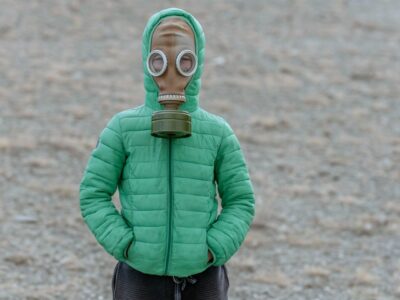Table of Contents[Hide][Show]
We all know by now of the connection between air pollution and climate change, but how is it affecting our individual lives? If you or someone you love deals with allergies, asthma, or other respiratory illnesses, it might be more connected than you thought.
A number of studies conducted over the past several years have shown a direct correlation between air pollution and the exacerbation of allergies and asthma, as well as a high likelihood of air pollution actually causing these conditions in some cases.
Caught in a TRAP
While several individual mechanisms have been tested for allergic and asthmatic response, few studies have taken into account the cumulative effect of all pollutants an individual is exposed to at one time. One exception to this is the case of Traffic-Related Air Pollutants (TRAP). TRAP is a complex mixture of particulate matter derived from combustion and non-combustion sources and various gases. TRAP is found to cause an increased sensitivity of the airways in asthmatics and airway inflammation in healthy non-asthmatics.
Studies vary in conclusion regarding the “safe” distance from major roadways to reduce the effects of TRAP, but it’s generally agreed to be about 500 m, putting roughly 40% of people in major cities in this danger zone. These are often the lowest-income areas of urban areas, bringing into question individual social responsibility when it comes to keeping these children and families safe.
Understanding Ozone
Ozone is better known as the gas in the earth’s upper atmosphere that forms a protective layer against harmful rays from the sun. However, ozone is also found near ground level, a result of chemical emissions being heated by the sun, contributing to smog. The risk of asthma and allergies rises as the concentration of ozone in the air rises. In other words, the more densely populated an area, the more traffic and industry, the more smog and ozone. It irritates the lungs and makes it difficult to breathe. Long-term inflammation from breathing in too much ground-level ozone can permanently scar lung tissue.
What is the Role of Government?
Climate change prevention and peak oil issues have lead to policy initiatives incentivizing the development of renewable energy and alternatively powered vehicles. Passage of these policies can ultimately lead to improved air quality as well. Governments can go one step further by focusing on alternatives that don’t create additional or new particulate matter. City planners can implement traffic-reducing measures, like reduced parking and added bike lanes, in highly populated areas. These types of measures lead to improved lung function and a better quality of life for local residents.
What’s the Role of Business?
Employers have a corporate social responsibility to the wellness of workers. If you work with chemicals, sprays, powders or known allergens or carcinogens, you may be at a high risk for lung irritation and inflammation. Know the Occupational Health and Safety Administration (OSHA) guidelines for your workplace, and don’t be afraid to take extra precautions.
Even if you work in a seemingly chemical-free environment, you might be exposed to irritants via cleaning products or mold spores, or through remodeling dust and chemicals. Dust and carpet are powerful allergens, and furniture can off-gas toxic fumes.
What’s Your Role?
If you or a loved one suffer with asthma or allergies, there are a number of things you can do to reduce your exposure.
Start by understanding your body:
- Take note of your symptoms, and when they are at their worst. Are you indoors or outdoors? Is it morning or afternoon? What is the Air Quality Index level for that day?
- Consider what you were doing the day before your symptoms showed up, or what you were doing that morning. If you wake up with increased sensitivity to dust or mold, it might be correlated to your evening jog.
Know the general circumstances that lower air quality:
- Ozone tends to be worse on hot days, and later in the day.
- Particulate matter can be worse when the weather is calm, allowing it to build up instead of being blown away.
- Air pollution increases by busy roads (especially during rush hour), near factories and power plants, and near smoke from any source.
Plan your activities around outdoor conditions:
- If you’re going for a run, try to use a park trail instead of a roadway.
- Check the EPA Air Quality Index before planning outdoor activities, and learn where your personal threshold is. If you must be outside when the AQI is high, stick to light movements that don’t require heavy breathing.
- Plan your most vigorous outdoor exercise in the morning, especially in summer.
- Where a face mask while doing yard work to reduce irritation.
Maintain a healthy space in your home:
- Use natural cleaners and body care products.
- Use electric heaters with strong and clean HEPA filters, rather than wood-burning heat sources.
- Keep smoke from candles, incense, and especially cigarettes out of the house.
- When buying new furniture, stick to those that won’t off-gas chemicals. Consider tile or hardwood instead of carpet.
- Stick to natural pesticides or traps.
- Store any harmful products in a secondary detached building.
Keep yourself strong and healthy:
- Don’t smoke cigarettes, an obvious lung irritant.
- Eat a diet high in fruits and vegetables, with emphasis on the latter, to build your level of antioxidants.
- Maintain a healthy weight, as obesity may increase susceptibility.
- Keep hydrated. Dry lungs are more susceptible to wheezing and coughing.
- Work on breathing through your nose as much as possible so particles can be filtered out before reaching your lungs.
With the right information, there’s a lot you can do to reduce your allergy and asthma symptoms. Pick a couple items to implement now, and gradually increase your fighting power!
Sources for this article:
- https://www.ncbi.nlm.nih.gov/pmc/articles/PMC4465283/
- https://health.usnews.com/health-news/family-health/respiratory-disorders/articles/2010/06/11/air-pollution-and-asthma-4-ways-to-stay-safe-on-ozone-alert-days
- http://www.aafa.org/page/air-pollution-smog-asthma.aspx
- https://www.sciencedirect.com/science/article/pii/S166557961730011X
- https://www.aaaai.org/global/latest-research-summaries/Current-JACI-Research/pollution-allergy




